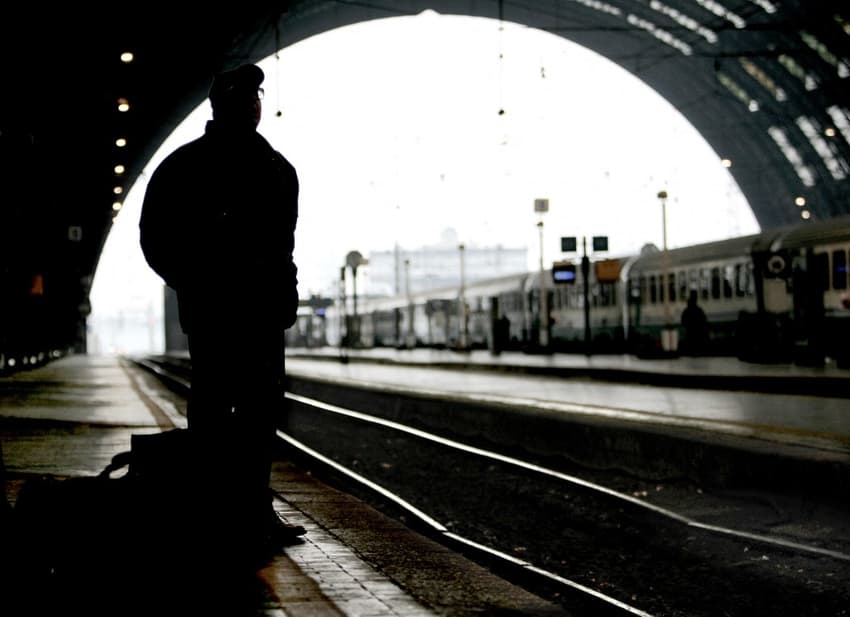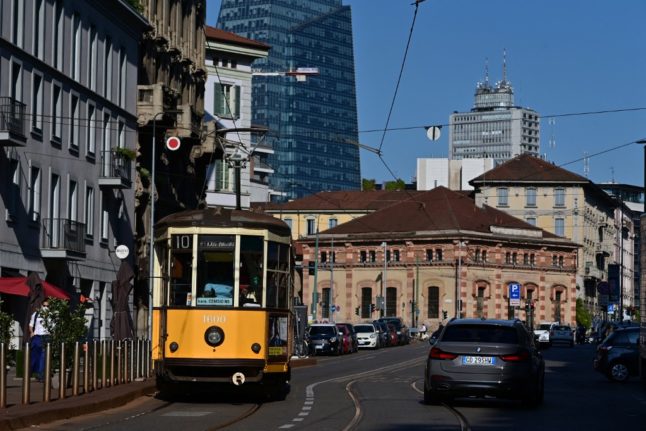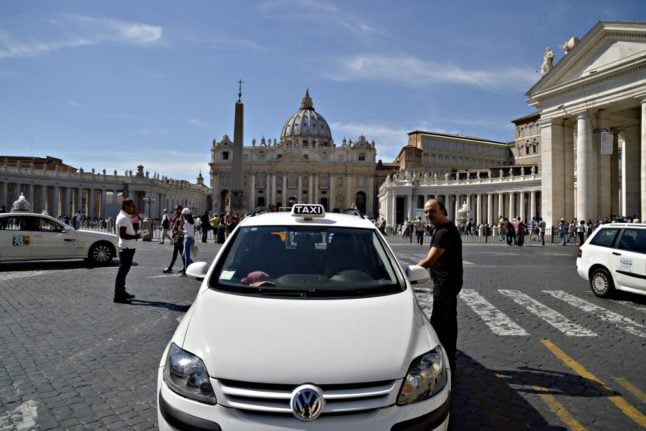Trains, taxis, hospitals: How are strikes affecting Italy on Friday?

Italian unions called a 24-hour strike on Friday affecting transport and other sectors, but how much disruption are these protests causing? Here’s what you need to know.
A nationwide 24-hour general strike affecting sectors from transport to education was expected to cause disruption in Italy on Friday, May 26th.
The strike was called earlier this month by USB (Unione Sindacati di Base) – one of Italy’s main trade unions – in protest against precarious work contracts and low wages.
READ ALSO: Why are there so many transport strikes in Italy?
As well as asking union members across the country to down tools for the day, USB is holding a protest in central Florence on Friday as it demands an end to temporary work contracts, an increase of 300 euros to all employees’ wages, a retirement age of 62, and a minimum state pension of 1,000 euros a month.
The union warned that the strike would affect schools, hospitals, transport and public offices, causing concern for those who need to get to work on the day as well as people travelling in Italy.
But, as always with strikes in Italy, the true impact was hard to predict as this mainly depends on how many union members decide to participate on the day.
Here’s a quick overview of what is - and isn’t - being affected on Friday.
According to Italy’s transport ministry, the strike involves:
- Railways
- Local public transport
- Sea transport
- Taxis
- School staff
- Hospital and healthcare staff
Airports and flights are not affected - though may be hit next week by an airport staff strike planned for Sunday, June 4th.
There will be no strike action in Emilia Romagna after the region was hit by severe flooding last week.
Italy’s fire brigade will not be participating in strike action either following the disaster in Emilia Romagna.
And it’s important to note that, as usual with strikes in Italy, the level of disruption to all types of services will vary by region and city.
Trains
In the case of services run by national rail operators Trenitalia and Italo the walkout will only last eight hours: from 9am to 5pm.
Trenitalia’s long-distance Frecce and Intercity trains were running as normal on Friday, though the company said some local and regional services may be affected.
The details of services which are guaranteed to run can be found on Trenitalia's website here.
Private operator Italo also confirmed services will be affected between 9am and 5pm, however again many services are guaranteed to run. See the company's full list here.
 A tram in Milan's Porta Nuova neighborhood. (Photo by MIGUEL MEDINA / AFP)
A tram in Milan's Porta Nuova neighborhood. (Photo by MIGUEL MEDINA / AFP)
Staff from northern rail company Trenord were participating in the 24-hour strike, but the company gave few details ahead of time as to the scale of disruption passengers should expect.
Trenord said some routes may be affected throughout the day and that its Milan-Malpensa airport connection was not guaranteed to operate, but said it would be replaced by a bus service if any services were cancelled.
There were no reports of widespread cancellations or delays to rail services in any major Italian cities as of midday on Friday.
Passengers are in any case advised to check their route's status on Friday before setting off.
Local public transport and taxis
Friday’s walkout was expected to affect all forms of local public transport, including buses, trams, metro lines and ferries.
People in northern cities including Turin, Milan, Trieste, Venice and Bologna are likely to see the most disruption from Friday’s walkout, according to media reports, though delays and/or cancellations are also possible elsewhere.

Photo by Andreas Solaro / AFP
As every Italian city has its own local transport operator the exact times and scale of disruption will vary everywhere in the country, and passengers are advised to ceck their local provider's website or social media for updates.
Strikes in Italy also don't mean a complete stop to all public transport services.
READ ALSO: Should you travel in Italy when there’s a strike on?
By law, all public transport companies in Italy are required to provide ‘minimum services’ on strike days, with guaranteed services including those for commuters at peak times as well as airport transfer lines, which tend to remain in operation, if on a reduced schedule.
Though taxi drivers were also expected to be involved in the strike, it was unclear to what extent or in which cities. There were no reports on Friday of disruption to taxi services.
Schools and hospitals
In addition to transport services, schools throughout the country are set to be affected by Friday's action, Italy's Education Ministry confirmed.
Whether and to what extent individual schools remain open depends on how many and which staff decide to participate in the action.
In hospitals and healthcare facilities, the strike is expected to involve cleaning and catering staff, meaning there may be some changes to the usual levels of service.
Again, the scale of the impact will vary from one hospital to another depending on how many staff participate in Friday's strike.
You can keep up to date with the latest strike news from Italy HERE.
Comments
See Also
A nationwide 24-hour general strike affecting sectors from transport to education was expected to cause disruption in Italy on Friday, May 26th.
The strike was called earlier this month by USB (Unione Sindacati di Base) – one of Italy’s main trade unions – in protest against precarious work contracts and low wages.
READ ALSO: Why are there so many transport strikes in Italy?
As well as asking union members across the country to down tools for the day, USB is holding a protest in central Florence on Friday as it demands an end to temporary work contracts, an increase of 300 euros to all employees’ wages, a retirement age of 62, and a minimum state pension of 1,000 euros a month.
The union warned that the strike would affect schools, hospitals, transport and public offices, causing concern for those who need to get to work on the day as well as people travelling in Italy.
But, as always with strikes in Italy, the true impact was hard to predict as this mainly depends on how many union members decide to participate on the day.
Here’s a quick overview of what is - and isn’t - being affected on Friday.
According to Italy’s transport ministry, the strike involves:
- Railways
- Local public transport
- Sea transport
- Taxis
- School staff
- Hospital and healthcare staff
Airports and flights are not affected - though may be hit next week by an airport staff strike planned for Sunday, June 4th.
There will be no strike action in Emilia Romagna after the region was hit by severe flooding last week.
Italy’s fire brigade will not be participating in strike action either following the disaster in Emilia Romagna.
And it’s important to note that, as usual with strikes in Italy, the level of disruption to all types of services will vary by region and city.
Trains
In the case of services run by national rail operators Trenitalia and Italo the walkout will only last eight hours: from 9am to 5pm.
Trenitalia’s long-distance Frecce and Intercity trains were running as normal on Friday, though the company said some local and regional services may be affected.
The details of services which are guaranteed to run can be found on Trenitalia's website here.
Private operator Italo also confirmed services will be affected between 9am and 5pm, however again many services are guaranteed to run. See the company's full list here.

Staff from northern rail company Trenord were participating in the 24-hour strike, but the company gave few details ahead of time as to the scale of disruption passengers should expect.
Trenord said some routes may be affected throughout the day and that its Milan-Malpensa airport connection was not guaranteed to operate, but said it would be replaced by a bus service if any services were cancelled.
There were no reports of widespread cancellations or delays to rail services in any major Italian cities as of midday on Friday.
Passengers are in any case advised to check their route's status on Friday before setting off.
Local public transport and taxis
Friday’s walkout was expected to affect all forms of local public transport, including buses, trams, metro lines and ferries.
People in northern cities including Turin, Milan, Trieste, Venice and Bologna are likely to see the most disruption from Friday’s walkout, according to media reports, though delays and/or cancellations are also possible elsewhere.

As every Italian city has its own local transport operator the exact times and scale of disruption will vary everywhere in the country, and passengers are advised to ceck their local provider's website or social media for updates.
Strikes in Italy also don't mean a complete stop to all public transport services.
READ ALSO: Should you travel in Italy when there’s a strike on?
By law, all public transport companies in Italy are required to provide ‘minimum services’ on strike days, with guaranteed services including those for commuters at peak times as well as airport transfer lines, which tend to remain in operation, if on a reduced schedule.
Though taxi drivers were also expected to be involved in the strike, it was unclear to what extent or in which cities. There were no reports on Friday of disruption to taxi services.
Schools and hospitals
In addition to transport services, schools throughout the country are set to be affected by Friday's action, Italy's Education Ministry confirmed.
Whether and to what extent individual schools remain open depends on how many and which staff decide to participate in the action.
In hospitals and healthcare facilities, the strike is expected to involve cleaning and catering staff, meaning there may be some changes to the usual levels of service.
Again, the scale of the impact will vary from one hospital to another depending on how many staff participate in Friday's strike.
You can keep up to date with the latest strike news from Italy HERE.
Join the conversation in our comments section below. Share your own views and experience and if you have a question or suggestion for our journalists then email us at [email protected].
Please keep comments civil, constructive and on topic – and make sure to read our terms of use before getting involved.
Please log in here to leave a comment.